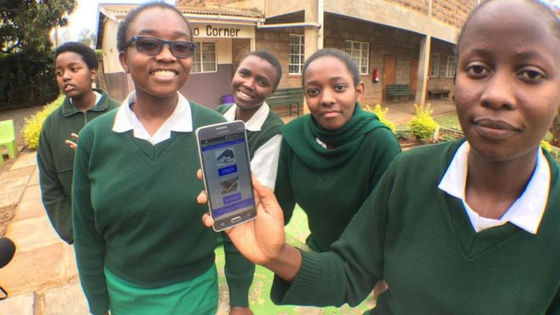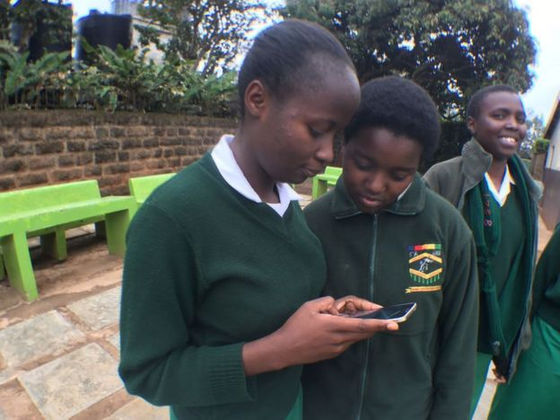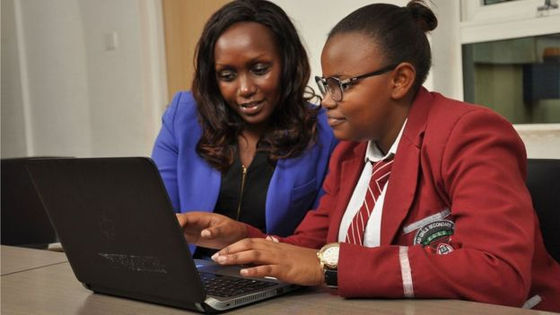Why did Kenyan high school girls develop applications from excellent ideas?

ByThoroughlyReviewed
Speaking of engineers, men's image may be stronger than women. It seems that this is simply an image from "where there are many men in engineers", but in realityMale-female ratio of IT engineersYou can see that there is a big difference when looking at. However, female engineers exist around the world, and young school girls in Kenya in Africa are also developing excellent apps.
Kenyan girls who code: Mentors spur African tech innovations - BBC News
http://www.bbc.com/news/world-africa-37489006
A 16 - year - old girl, Harriet Karanja, was lined up to buy a bus ticket for the capital of Kenya, Nairobi. At this time, the person who purchased the ticket and was waiting for the bus seemed to witness where the ticket was stolen. Mr. Karanja told the classmate about this episode, her friend seemed to have seen a similar scene, heard this, "I wonder if I managed to get rid of the ticket purchase line somehow?" It seems that it began to think.
Mr. Karanja used an educational program supported by "Safaricom", one of Kenya's mobile phone companies, together with four school friends to make an application to buy a bus ticket. Currently, it seems that we are conducting a ticket purchase test on a long distance bus running Kenya to see how the prototype of the application works.
Mr. Karanja says "The app takes GPS users and takes you to the bus station where you want to take a ride, so the user went to the bus stop, so the ticket was on the bus without going to the ticket purchase queue I can get on board. "Explains the function of the application. The name of the application is "M - Safiri", which is said to mean "travelers" in Swahili, the official language of Kenya.

Five girls including Karanja who developed "M - Safiri" participated in a competition competing female students' skills held in San Francisco, USA. The team's name is "Snipers", it seems he won the competition final but he seems to have missed the championship prize of 10,000 dollars (about 1 million yen). The victory was a social networking application for volunteers made by female students in Mexico.
Beyond having won the award in the international competition, it was a big event for Karanja who had various experiences overseas. After graduating from high school, the five people transform the team into a technology company, aiming for patent acquisition and official release of the application.
Priscilla Wanbui, one of his teammates, said, "We did not know how to write the code and how to set up a business plan, so it takes a very long time to learn them normally It would have been a big problem for us if that happened, "says Safaricom's support program was indispensable for application development.

Mr. Karanja is not the only person who made great leap forwards in receiving the education support program. Damaris Muteti, a teacher in Kenya, is a person who studied how to write code with Intel's educational support program. Why the teacher Muteti began studying the code, a 17-year-old high school girl Caroline Wanbui, a student, came up with an idea to connect an organ donor to a patient or a hospital.
"One Buoy had a very good idea, and if I could help Mr. One Bui, she thought that she would be able to give advice on technology to other young women. I thought it would be a good opportunity to learn how to use computers not only for Kenya but for Africa as a whole, "Muteti talks about the reason for learning the code.

Mr. One Buoy and Muteti have also found a partner to build a prototype of the application on the tablet and to proceed with development. However, it seems he faced obstacles just before releasing the application. The obstacle relates to "providing organs after death", and it is said that whether it is legal or illegal is in a state of pending review. Today, illegal organ buying / selling cartels in Kenya are making a hype, but if the idea of One Booi will be accepted by law, this will have a big impact on the industry, BBC News.
Incidentally,World Wide Web FoundationAccording to the slums in Nairobi, Kenya where Mr. One Bui lives, there seems to be only 20% of women who can use the Internet. On the other hand, 57% of men living in the same area can use the Internet. Improving such disparity may lead to the advancement of women into society and the creation of excellent ideas.
Related Posts:
in Note, Posted by logu_ii







